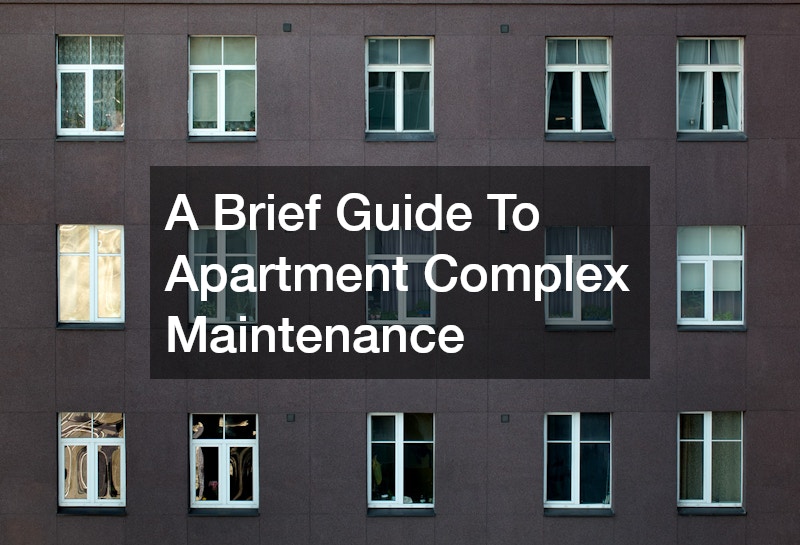Maintaining an apartment complex is essential to ensuring a safe, comfortable, and attractive living environment for residents. Beyond simply keeping things looking good, effective maintenance protects property values, supports tenant retention, and ensures compliance with laws and regulations. This guide explores the many facets of apartment complex maintenance, from understanding what it entails and developing plans to handling emergencies and legal considerations. Whether you are a property manager, landlord, or maintenance professional, these insights will help you manage your property more efficiently and effectively, including coordinating with specialized services such as commercial roof installations and commercial metal roofers.
What Is Apartment Complex Maintenance?
Definition and Scope
Apartment complex maintenance involves the ongoing care, repair, and upkeep of both the physical buildings and surrounding grounds of a residential community. This includes everything from plumbing and electrical systems inside individual units to landscaping, parking lots, and common areas. Maintenance covers routine tasks, preventive measures, and emergency repairs that keep the property functional and appealing. Many apartment complexes also require professional services from commercial painters to maintain fresh, inviting exteriors and from fencing contractors who ensure boundary security and privacy for residents.
Importance for Residents
For tenants, maintenance directly affects their quality of life. Well-maintained apartments promote health, safety, and comfort. Issues like broken heating, leaky pipes, or pest infestations can lead to dissatisfaction, complaints, or even early lease terminations. Prompt, thorough maintenance fosters a positive community atmosphere and builds tenant trust. The presence of a secure security gate system further enhances tenant confidence by controlling access and increasing overall safety on the property.
Impact on Property Value
Maintaining an apartment complex preserves and often enhances its market value. Neglected properties experience accelerated wear and deterioration, which can reduce rental income and resale potential. Proactive maintenance helps avoid costly renovations and capitalizes on the investment by keeping the property attractive and in good condition. For example, engaging commercial metal roofers for high-quality commercial roof installations can extend the lifespan of roofing systems and prevent leaks, protecting the building’s structural integrity.
Regulatory Requirements
Apartment complexes must comply with a variety of local, state, and federal regulations regarding health, safety, and building codes. These laws often dictate standards for fire safety, sanitation, electrical systems, and accessibility. Failure to meet regulatory requirements can lead to fines, legal disputes, and damage to reputation. Compliance also involves meeting insurance requirements such as Landlord Insurance, which safeguards property owners against risks associated with damage or liability.
Key Actors in Maintenance
Multiple roles contribute to maintenance efforts, including property managers who coordinate activities, maintenance staff who perform repairs, contractors for specialized jobs, and tenants who report issues. Clear communication and defined responsibilities among these actors are critical to effective upkeep. For example, working with commercial locksmiths ensures that locks and security systems remain functional and secure, an essential part of maintaining safe access for residents.
How to Develop a Maintenance Plan?

Assessing Property Needs
The foundation of any maintenance plan is a thorough assessment of the property’s current condition. This involves inspecting all units, common areas, mechanical systems, and outdoor spaces to identify existing problems and potential vulnerabilities. Gathering input from maintenance personnel and tenants provides a comprehensive view. Engaging professionals like an HVAC company can be vital during assessments, as heating and cooling systems require specialized knowledge to evaluate properly.
Setting Priorities
Not all maintenance needs are equally urgent or important. After assessing the property, it is vital to prioritize repairs and upkeep tasks based on factors such as safety risks, impact on residents, and cost implications. This ensures resources are allocated efficiently and critical issues addressed promptly. For example, emergency plumbing concerns addressed through a reliable 24 hour emergency plumbing service must take precedence to avoid damage and tenant inconvenience.
Budgeting for Maintenance
A realistic budget supports consistent maintenance without unexpected financial strain. Consider recurring expenses like routine inspections and seasonal upkeep, as well as funds for unforeseen repairs. Reviewing historical spending and consulting with professionals can help establish accurate budget forecasts. Allocating funds to essential services such as commercial roof installations, pressure washers for exterior cleaning, and regular painting by commercial painters ensures the property remains appealing and protected.
Scheduling Regular Inspections
Routine inspections help detect issues early before they escalate into major problems. Scheduling periodic checks for plumbing, electrical systems, roofing, HVAC units, and structural integrity ensures ongoing monitoring. A calendar-based approach allows maintenance teams to prepare and avoid last-minute emergencies. Involving fencing contractors in regular inspections guarantees that perimeter fencing remains secure and intact, an important aspect of property safety.
Utilizing Maintenance Software
Modern maintenance software solutions enable streamlined tracking, scheduling, and documentation of maintenance activities. These tools can automate reminders for inspections, record repair histories, and facilitate communication between staff and tenants. Employing technology enhances organization and accountability, especially when coordinating multiple contractors such as commercial locksmiths, commercial painters, and roofing specialists.
What Are Common Maintenance Issues?
Plumbing Problems
Leaks, clogged drains, and faulty fixtures are among the most frequent plumbing issues in apartment complexes. Left unchecked, these problems can cause water damage, mold growth, and increased utility costs. Prompt attention to plumbing issues is essential for tenant satisfaction and property preservation. Utilizing a 24 hour emergency plumbing service ensures urgent problems are addressed swiftly to minimize damage.
Electrical Issues
Faulty wiring, tripped breakers, and malfunctioning outlets pose safety hazards and inconvenience residents. Regular electrical system inspections and timely repairs prevent fire risks and power disruptions, ensuring compliance with safety codes. Commercial locksmiths may also be involved in maintaining electrical lock systems and access controls to protect residents and property assets.
HVAC System Failures
Heating, ventilation, and air conditioning systems are crucial for comfort but require regular maintenance to operate efficiently. Dirty filters, refrigerant leaks, or mechanical failures reduce performance and increase energy costs. Proper upkeep extends system lifespan and maintains tenant comfort. Contracting a reputable HVAC company to provide routine servicing and emergency repairs is essential for optimal system functioning.
Structural Repairs
Cracks in walls, damaged roofing, or compromised foundations can threaten the building’s integrity and safety. Early identification and repair of structural problems protect the property from further deterioration and costly rebuilds. In many apartment complexes, commercial metal roofers are called upon to install or repair durable commercial roof installations that withstand weather and wear.
Pest Control
Rodents, insects, and other pests can create health risks and damage property. Integrated pest management strategies, including routine inspections and treatment plans, are vital for maintaining a clean and safe living environment. Effective fencing contractors can also help limit pest entry by maintaining secure and intact perimeter fencing.
How to Maintain Outdoor Spaces?

Landscaping and Gardening
The appearance of outdoor areas significantly impacts the overall impression of an apartment complex. Regular lawn care, tree trimming, planting flowers, and removing debris contribute to curb appeal and tenant satisfaction. Pressure washers are commonly used to clean sidewalks, building exteriors, and common areas, keeping the grounds looking pristine.
Lighting and Safety in Common Areas
Proper illumination of pathways, entrances, and parking lots enhances safety and security. Regular maintenance of lighting fixtures, including bulb replacements and electrical repairs, ensures these areas remain well-lit and inviting. Installing or maintaining a security gate system provides controlled access and increases safety for residents.
Pool Maintenance
Pools require specialized care, including chemical balancing, cleaning, and equipment checks, to remain safe and usable. Neglecting pool maintenance can lead to health hazards and liability concerns.
Maintenance of Play Areas
Playgrounds and recreational facilities need inspection for wear and damage. Maintaining safe surfaces, repairing equipment, and ensuring cleanliness protect residents, especially children.
Parking Lot Upkeep
Cracks, potholes, faded markings, and drainage problems in parking areas should be addressed promptly. Well-maintained parking lots improve usability and reduce liability risks. Regular maintenance supports safety and enhances the overall appearance of the complex.
What Is Preventive Maintenance?
Understanding Preventive Maintenance
Preventive maintenance involves regularly scheduled inspections and servicing designed to prevent breakdowns and costly repairs. This proactive approach aims to identify and address potential issues before they escalate. For example, engaging commercial metal roofers for routine roof inspections as part of preventive maintenance helps avoid leaks and major repairs later.
Benefits of Preventive Actions
Adopting preventive maintenance increases equipment reliability, reduces emergency repairs, and extends the lifespan of property components. It also enhances tenant satisfaction by minimizing disruptions caused by unexpected failures.
Creating a Preventive Maintenance Schedule
A detailed schedule outlines when various systems and structures should be inspected or serviced. This includes HVAC tune-ups, roof inspections, plumbing checks, and landscaping tasks, tailored to the property’s specific needs and local climate. Scheduling pressure washing of exterior surfaces and repainting by commercial painters also fits into preventive maintenance, preserving curb appeal.
Tools and Techniques in Preventive Maintenance
Using checklists, condition monitoring, and maintenance management software supports consistent preventive care. Employing diagnostic tools and expert assessments helps pinpoint problems early. This structured approach ensures components like the security gate system and fencing remain functional and secure.
Tracking and Reporting Preventive Maintenance
Documenting all preventive activities allows for accountability and trend analysis. Maintenance logs can guide budgeting, staffing, and future planning decisions.
How to Handle Emergency Repairs?
Identifying Urgent Issues
Emergencies in apartment complexes include gas leaks, flooding, power outages, and structural failures. Recognizing these situations quickly is crucial to minimize harm and damage. Having access to a 24 hour emergency plumbing service can be a lifesaver when sudden leaks or water damage occur.
Emergency Protocols and Plans
Having clear, written protocols ensures that staff and tenants know how to respond during emergencies. Plans should include evacuation routes, contact information for emergency services, and steps to secure the property.
Efficient Communication Systems
Reliable communication channels enable rapid coordination during emergencies. Systems such as phone trees, email alerts, and text messaging keep everyone informed.
Training Staff for Emergencies
Regular training prepares maintenance teams and property staff to act decisively in urgent situations. Drills and scenario planning build confidence and readiness.
Tenant Responsibilities During Emergencies
Educating tenants about their role during emergencies, including reporting issues promptly and following safety instructions, supports overall community safety.
What Role Do Tenants Play in Maintenance?
Reporting Issues
Tenants are the eyes and ears of the property. Encouraging them to promptly report maintenance problems helps prevent minor issues from worsening.
Tenant Maintenance Responsibilities
Lease agreements often outline tenant duties such as proper waste disposal, maintaining cleanliness, and minor upkeep. Clarifying these responsibilities promotes shared ownership of property condition.
Encouraging Tenant Engagement
Engaging tenants through newsletters, meetings, or digital platforms fosters a collaborative environment. Active participation supports timely maintenance and community pride.
Tenant Education on Maintenance
Providing tenants with information on how to care for appliances, report problems, and conserve resources reduces maintenance demands and costs.
Feedback and Improvement Systems
Soliciting tenant feedback about maintenance services identifies areas for improvement and enhances service quality.
How to Budget for Maintenance?
Understanding Costs
Maintenance expenses include labor, materials, equipment, contracts, and administrative overhead. Recognizing the full cost spectrum supports accurate budgeting.
Allocating Funds Properly
Funds should be divided between routine maintenance, preventive care, emergency reserves, and capital improvements. Balanced allocation prevents neglect or overspending. Investment in services such as commercial roof installations, hiring commercial painters, and contracting fencing contractors should be planned in the budget.
Planning for Unexpected Expenses
Setting aside contingency funds prepares the property for unforeseen repairs or sudden failures, minimizing financial stress.
Securing Financing for Major Repairs
Large-scale projects may require loans, grants, or special assessments. Exploring financing options ahead of time ensures readiness when significant expenditures arise.
Cost-Saving Strategies
Implementing energy-efficient upgrades, negotiating vendor contracts, and prioritizing preventive maintenance can reduce overall costs while maintaining quality. Regular pressure washing extends the life of exterior finishes and reduces repainting frequency, saving money over time.
What Are the Legal Aspects of Maintenance?
Local and State Regulations
Compliance with building codes, safety standards, and health regulations is mandatory. Staying informed about changes in laws helps avoid penalties and liabilities.
Liability and Compliance
Property owners and managers may be held liable for injuries or damages resulting from inadequate maintenance. Ensuring compliance mitigates legal risks. Having adequate Landlord Insurance provides financial protection in these situations.
Lease Agreements and Maintenance
Lease documents should clearly define maintenance responsibilities for both landlords and tenants. Well-drafted agreements reduce disputes and clarify expectations.
Warranty and Contractor Obligations
Contracts with vendors and contractors must specify maintenance, repair obligations, and warranty coverage to protect the property owner’s interests. This includes contracts with commercial locksmiths, commercial painters, and fencing contractors.
Resolving Disputes
Effective dispute resolution mechanisms, such as mediation or arbitration, help address conflicts related to maintenance without costly litigation.
How to Choose a Maintenance Team?

Hiring In-house vs. Outsourcing
Deciding between in-house staff and external contractors depends on property size, complexity, and budget. Each approach has distinct advantages and challenges. Outsourcing tasks like commercial roof installations or fencing installation to specialized contractors may offer better expertise.
Qualifications of Maintenance Personnel
Maintenance staff should possess relevant skills, certifications, and experience to handle diverse tasks safely and competently.
Vendor Selection Process
Choosing reliable vendors requires vetting credentials, references, pricing, and service guarantees. Establishing strong partnerships benefits long-term maintenance.
Training and Development
Ongoing training keeps maintenance teams updated on industry best practices, safety protocols, and new technologies.
Evaluating Performance
Regular assessment of maintenance personnel and contractors through performance metrics, feedback, and inspections ensures high standards are maintained.
Closing Thoughts
Apartment complex maintenance is a multifaceted task that demands careful planning, consistent effort, and cooperation among managers, maintenance teams, and tenants. It safeguards resident wellbeing, protects property investment, and ensures regulatory compliance. By understanding the scope of maintenance, developing robust plans, embracing preventive strategies, and addressing emergencies efficiently, property owners can create thriving living communities. Investing in skilled teams and fostering tenant engagement further enhances maintenance outcomes. Prioritizing these practices—including partnering with commercial metal roofers, commercial painters, fencing contractors, and an HVAC company—is essential for sustaining the value and appeal of any apartment complex. Take action today to implement comprehensive maintenance approaches that benefit both residents and property owners alike.

